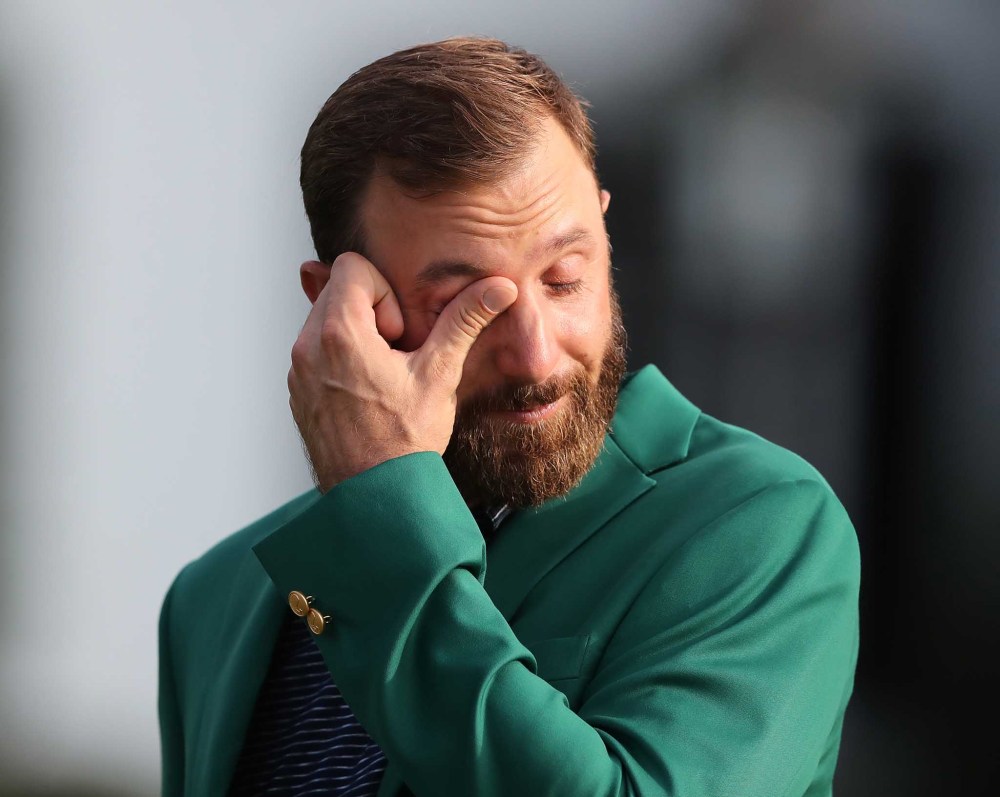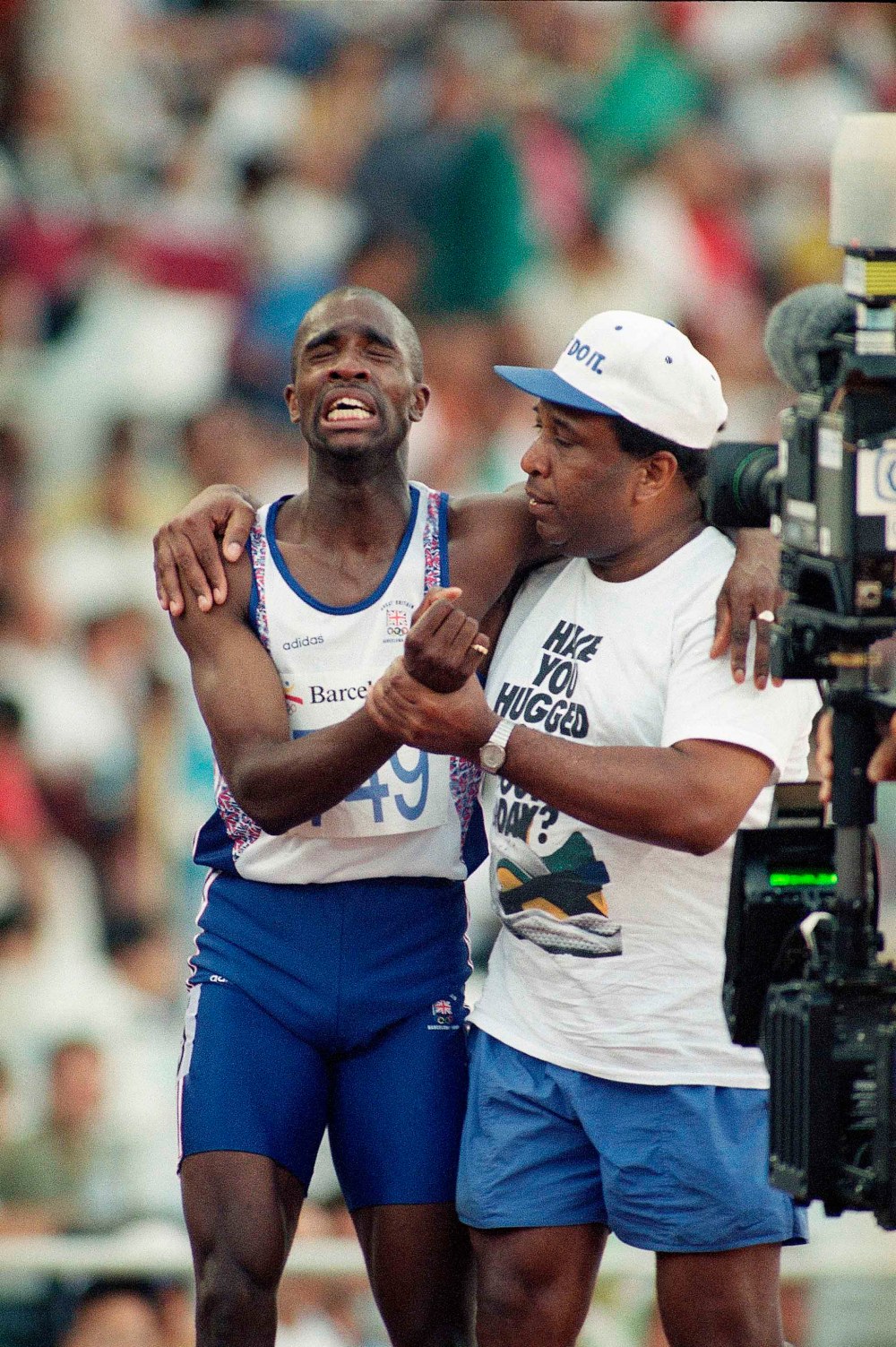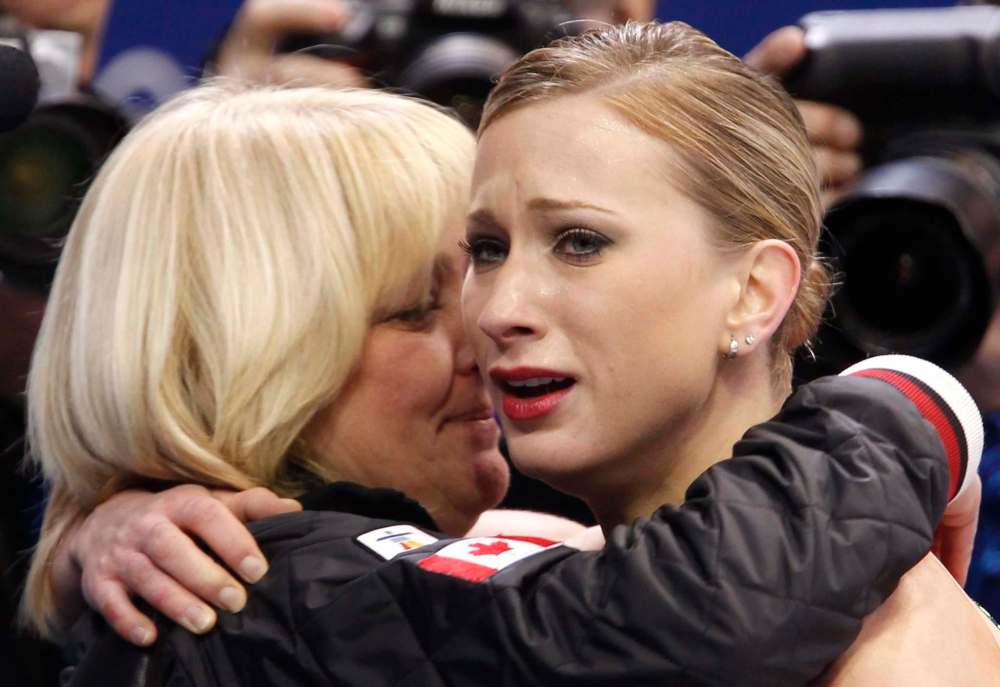Big emotions part of the game
Athletes driven to tears by personal loss, unexpected achievement
Advertisement
Read this article for free:
or
Already have an account? Log in here »
To continue reading, please subscribe:
Monthly Digital Subscription
$0 for the first 4 weeks*
- Enjoy unlimited reading on winnipegfreepress.com
- Read the E-Edition, our digital replica newspaper
- Access News Break, our award-winning app
- Play interactive puzzles
*No charge for 4 weeks then price increases to the regular rate of $19.00 plus GST every four weeks. Offer available to new and qualified returning subscribers only. Cancel any time.
Monthly Digital Subscription
$4.75/week*
- Enjoy unlimited reading on winnipegfreepress.com
- Read the E-Edition, our digital replica newspaper
- Access News Break, our award-winning app
- Play interactive puzzles
*Billed as $19 plus GST every four weeks. Cancel any time.
To continue reading, please subscribe:
Add Free Press access to your Brandon Sun subscription for only an additional
$1 for the first 4 weeks*
*Your next subscription payment will increase by $1.00 and you will be charged $16.99 plus GST for four weeks. After four weeks, your payment will increase to $23.99 plus GST every four weeks.
Read unlimited articles for free today:
or
Already have an account? Log in here »
Hey there, time traveller!
This article was published 21/11/2020 (1807 days ago), so information in it may no longer be current.
No one was surprised when Dustin Johnson, the No. 1-ranked golfer in the world, won the Masters Tournament last Sunday at Augusta National Golf Club with a record-setting score of 20-under par.
But almost everyone was surprised when the normally stoic 36-year-old golf pro, long considered one of the most aloof athletes in the sport, broke down and cried after earning his first green jacket.

Johnson, who grew up about an hour from Augusta, shared an embrace with his partner, Paulina Gretzky, after securing the win and was then asked by CBS reporter Amanda Balionis what the victory meant to him.
The newly minted champion looked down at the Augusta National logo emblazoned on his jacket, then paused for about 10 seconds as he struggled to find the words in what became a remarkably heart-felt moment.
“It’s a dream come true. As a kid, I always dreamed of being a Masters champion,” he said before he began to tear up and found himself unable to speak. “It’s just incredible.”
Looking over at his family, the emotions grew stronger. “It’s hard to talk,” he said, wiping tears from his eyes. “I’ve never had this much trouble gathering myself. On the golf course I’m pretty good at it, out here I’m not. I’ve put in a lot of hard work. I’ve got a great team, who…”
It will come as little surprise to sports fans that Johnson is far from the first star athlete to melt down in an emotional moment, as we see from today’s slightly damp list of Five Athletes Who Famously Broke Down in Tears:
5) The emotional athlete: Terrell “T.O.” Owens
The famous waterworks: Judged solely by his on-field performance, Terrell Owens, famously known by his initials, T.O., is a Hall of Famer and one of the greatest wide receivers to ever step on a football field. A six-time Pro Bowl selection and five-time first-team All-Pro, Owens holds or shares several NFL records. But there is a lot more to his legacy than just touchdowns.
Owens will also go down in history as one of the most outspoken, flamboyant and polarizing players the game has seen. A physical marvel, he also dropped more than a few catchable passes and often became visibly upset when his team wasn’t doing well. His specialty was throwing his own team’s quarterback under the bus during hard times. When he was with the San Francisco 49ers, his ongoing feud with quarterback Jeff Garcia became the stuff of legend.
In 2008, however, after the Dallas Cowboys’ season ended in a nail-biting playoff loss to the New York Giants, the softer, sensitive side of Owens emerged. After the game, an emotional Owens appeared on camera at the team’s press conference to address the unexpected loss, which many observers pinned on quarterback Tony Romo.
There was Owens, wearing a pair of pitch-black aviator shades to hide the tears welling in his eyes, getting downright sentimental as he defended Romo’s honour. “It’s not about Tony,” he blubbered. “You guys can point the finger at him. You can talk about the vacation. …” His voice trailed off, then cracked and wobbled, but Owens pressed on, struggling to contain his sobs, blurting out sentences between them. “If you do that, that’s really unfair,” Owens famously sniffed. “Really unfair. That’s my teammate. That’s my quarterback. We lost as a team. We lost as a team, man!” That moment of unity didn’t last long, as Owens trashed Romo in years to come.
4) The emotional athlete: Wayne “The Great One” Gretzky
The famous waterworks: It was a breakup that shattered the heart of a hockey-loving nation. If you are a Canadian, you remember where you were 32 years ago on the fateful day Wayne Gretzky was traded from the Edmonton Oilers to the Los Angeles Kings. It came 12 weeks after the Oilers closed out a four-game sweep of the Boston Bruins in the Stanley Cup Final.
On Aug. 9, 1988, Oilers owner Peter Pocklington, in need of cash, traded Gretzky, along with Marty McSorley and Mike Krushelnyski, to the Los Angeles Kings for Jimmy Carson, Martin Gelinas, $15 million in cash, and the Kings’ first-round draft picks in 1989, 1991 and 1993. Trading the heart and soul of the Oilers’ dynasty was a sucker punch that left Canadian hockey fans in disbelief.
The greatest hockey player ever was famously unable to hold back a flood of tears at the news conference announcing what is now known simply as “The Trade.” One weepy moment stands out in the memories of grieving Canadians. “I promised Mess (teammate Mark Messier) I wouldn’t do this, but the time comes when…,” a tearful Gretzky sniffed before, overcome by a tidal wave of sports-related emotion, he stopped speaking altogether. Which is when the rest of Canada began crying. If Gretzky can be traded, grieving fans realized, then anyone can be traded. In Edmonton, Pocklington was burned in effigy by angry fans.
In Ottawa, a member of Parliament called on the government to block the trade or buy Gretzky’s contract and sell it to another Canadian team. “The Oilers without Gretzky is like apple pie without ice cream, like winter without snow, like Wheel of Fortune without Vanna White,” NDP House Leader Nelson Riis huffed at the time. In his first appearance in Edmonton after the trade, No. 99 got a four-minute standing ovation and declared: “I’m still proud to be a Canadian. I didn’t desert my country. I moved because I was traded and that’s where my job is. But I’m Canadian to the core. I hope Canadians understand that.” We do, Wayne, but we still need a tissue.
3) The emotional athlete: Hoop legend Michael Jordan
The famous waterworks: You could call Michael Jordan the Wayne Gretzky of basketball, but that seems like an understatement. We don’t have room in this newspaper to list all of Jordan’s accomplishments on a basketball court, most with the Chicago Bulls.
Consider the fact his biography on the official NBA website states: “By acclamation, Michael Jordan is the greatest basketball player of all time.” When it comes to weeping openly, however, His Airness also warrants a spot in the Crying Hall of Fame. An AP photo of Jordan sobbing during his Basketball Hall of Fame induction ceremony in 2009 has taken the internet by storm as the infamous “Crying Michael Jordan” meme.
It has become the sports world’s go-to symbol of sadness in defeat, with renditions of Jordan’s watery mug superimposed onto losing players, losing fans, losing mascots, losing coaches, or anyone or anything else who is at all associated with a loss. The most memorable tears the superstar ever shed came on June 16, 1996, when Jordan scored 22 points, grabbed nine rebounds, dished out seven assists and won his fourth NBA championship after leading his Bulls to an 87-75 Game 6 victory over the Seattle SuperSonics.
The image of MJ that is seared into our memories isn’t one of a game-winner, a breathtaking dunk, or anything on the court; it’s the sight of him crying on the locker room floor after the game. Grasping the game ball after the final buzzer sounded, Jordan ran back to the locker room and collapsed onto the floor, sobbing in joy and anguish. Jordan’s emotions were running high because it was Father’s Day and this was his first championship without his father,
James R. Jordan, by his side. Jordan Sr. was the victim of a murder in a carjacking in 1993, when he was returning from a funeral and pulled over on the highway to take a nap. Two men shot him to death while he slept, then stole the vehicle, which contained two championship rings Jordan gave his dad. In 1996, Jordan made his way back to the court for trophy presentation. As the crowd wildly chanted, “MVP! MVP!”, a tearful MJ dedicated the championship to his father, declaring: “I know he’s watching. This is for Daddy.”
2) The emotional athlete: Sprinter Derek Redmond
The famous waterworks: It is has been called one of the most heart-wrenching, goosebump-inducing moments in Olympic history. Even now, 28 years later, it is difficult to watch the video without bursting into tears. At the 1992 Barcelona Olympics, British sprinter Derek Redmond had qualified for the semifinal of the 400m with the fastest time in his heat.

Redmond was looking strong when suddenly he pulled up — his hamstring had torn. He sank to his knees on the track, clutching his leg in agony. Instead of allowing Red Cross workers to carry him off the track, the sprinter pushed himself back to his feet and bravely began hobbling toward the finish line. “I got up quicker than I got out of my blocks,” he said later. “I said to myself: ‘There’s no way I’m going to be stretchered out of these Olympics.’ I didn’t know where I was. I really, really believed I could still qualify.”
But he didn’t have to finish alone — Redmond’s father, Jim, ran from the stands and brushed off security to join his son. He told his son to stop, in case the injury might heal in time for him to compete in the relay. Derek refused. “Well then,” his father said, “we’re going to finish this together.” And finish it they did, slowly, and with the younger man’s anguish becoming visibly greater with every pace. Sobbing, Derek hobbled to the finish line, using his father as a crutch.
“After I crossed the line I was taken to the doctors and I was crying like a baby the whole time,” Redmond recalled. “I had no idea how the crowd had reacted until I saw the video — they were the last thing on my mind. It could have gone one of two ways: they’d either think ‘what a complete prat’ or ‘good on him.’ Luckily they chose the second one.”
Observed Britain’s Guardian newspaper: “What made this moment special was that it brought into focus not just the near-heroic desperation of a single professional athlete but a much more universal theme: the nature of parenthood.”
1) The emotional athlete: Olympian Joannie Rochette

The famous waterworks: It was a dream come true for figure skater Joannie Rochette when she was selected to represent Canada at the 2010 Winter Olympics in Vancouver. Not only would she skate for her country, but her mother, the woman she called her best friend, would be watching in the stands. And then the dream became a nightmare — Thérèse Guèvremont-Rochette died of a massive heart attack just a few hours after arriving with her husband in Vancouver to watch her daughter compete.
Two days after learning of her mother’s death, fighting back tears and with a trembling smile, Rochette, 24, took to the ice with her country and much of the world watching. Spectators in Vancouver took to calling the Montreal-area native “Canada’s daughter.” Despite a broken heart, she turned in the performance of her life in the short program, delivering what the New York Times called “a poignant Olympic performance Tuesday that was summoned from heartbreaking grief and extraordinary composure.”
She was the first skater in the final group of the night and many in the crowd shot to their feet and waved the Maple Leaf to buoy her with their support. “She had the whole nation carrying her through this performance,” said Brian Orser, a two-time Olympic silver medallist for Canada and a skating coach. Wearing an elegant costume with a red rose etched on the back, Rochette bravely skated to a personal best score, finishing third. (She would go on to win the bronze medal.)
Her father, Norman, wept the entire time his daughter was on the ice. Hand over her heart, she received a deafening standing ovation, and the tears began to flow. She skated off the ice and fell weeping into the arms of her coach, Manon Perron. While she waited for her marks with tears in her eyes, it appeared she was repeating one sentence, over and over: “C’est pour toi, Maman.” For you, Mom.
doug.speirs@freepress.mb.ca

Doug has held almost every job at the newspaper — reporter, city editor, night editor, tour guide, hand model — and his colleagues are confident he’ll eventually find something he is good at.
Our newsroom depends on a growing audience of readers to power our journalism. If you are not a paid reader, please consider becoming a subscriber.
Our newsroom depends on its audience of readers to power our journalism. Thank you for your support.



